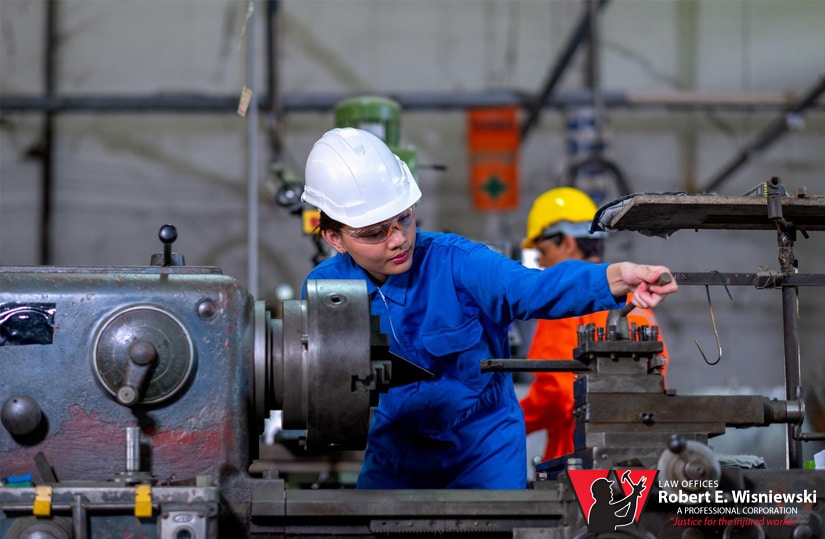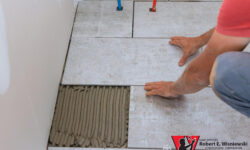Understand your rights and learn how to get maximum compensation for defective equipment-related injuries in the Arizona workplace.
A large percentage of workers today are engaged in activities that require the use of power tools, moving machinery and heavy equipment. While mechanization has made their jobs easier, it also exposes them to more hazards.
The Bureau of Labor Statistics (BLS) reports that, in 2021, worker fatalities exceeded 705 deaths from contact with objects and equipment. That was the 4th leading cause of occupational fatalities in the United States.
Non-fatal injuries far exceed that number. In 2020 alone, the BLS reports that 196,140 workers were injured from contact with objects and equipment, which includes the following:
- A worker being struck by a moving object
- A worker stepping on or being thrown against or pushed into an object

- A worker getting their body compressed, squeezed, crushed or pinched between objects or in a wire or rope
- A worker getting struck or crushed in a collapsing structure, equipment or other material
Most common industries where workers experience machine-related injuries
Machine entanglements are frequent causes of worker injuries. The BLS reports that they account for more than 34,000 casualties each year, and more than 12% of those occur in the manufacturing industry. In fact, manufacturing accounts for more than 40% of machine-related deaths.
Other typical industries where machine-related injuries occur include:
- Agriculture
- Cargo or baggage handlers at airports
- Construction
Common defective equipment that leads to injuries at work
Some of the common types of defective equipment that cause worker injuries include:
- Hand tools
- Industrial equipment, such as conveyor belts and rotators
- Temporary scaffolding and other elevated structures
- Collapsing cranes
- Transportation equipment, including forklifts and hoists
- Poorly insulated electrical equipment
Common reasons for machine malfunctions
The most common reasons for machinery malfunctions include the following:
- The machinery is newly installed and still getting worn in.
- The newly installed machinery is defective upon delivery.
- The machinery is old and breaking down from normal wear and tear.
Machinery can have defects upon delivery for 3 reasons:
- A machine can be delivered with design defects making them inherently hazardous for the intended use.
- A machine’s integrity can be compromised in the manufacturing process. Manufacturers are often forced to make recalls, particularly when the defective machine is a danger to workers using them.
- Marketing defects occur when they are improperly or inadequately labeled with warnings to users.
Machinery and equipment experience ordinary wear and tear and can be dangerous to workers if they’re not frequently inspected and properly maintained.
Common injuries caused by machine malfunctions
Machinery malfunctions are responsible for numerous kinds of worker injuries. They include the following:
- Traumatic brain injuries (TBI) from mild to severe
- Electrocution injuries
- Burns
- Crushed limbs
- Back or spinal cord injuries
- Amputated limbs or fingers
- Bone fractures
- Lacerations
Arizona workers’ compensation law
Arizona, like every other state, has a system of no-fault insurance that requires most employers to carry insurance to compensate their employees for injuries or illnesses that occur on the job. The system is administered by the Industrial Commission of Arizona (ICA).
Anyone who employs 1 or more workers must carry workers’ comp insurance or, subject to limitations, self-insure. An employer who fails to cover their employees will be subject to substantial civil and criminal penalties.
Full- and part-time employees are entitled to benefits in the event of an injury or illness that occurs while the employee is working and is related to their work. Independent contractors are not entitled to workers’ comp benefits.
Types of workers’ compensation benefits
Workers’ compensation benefits include the following:
- Reasonable and necessary medical care costs. This includes emergency room visits, doctor appointments, hospital bills, medication and other medical costs.
- Restitution for lost wages. This amount is equal to two-thirds of the difference between the amount of your average monthly wages that you received before your injury and the wages you receive after your injury (if any) for a period depending on the severity of your disability.
- Death benefits. These include funeral expenses and lost income for family members if you die from a work-related injury or illness.
How to file a claim for workers’ comp benefits in Arizona
If you’re injured and eligible for workers’ comp benefits, you must closely follow the requirements for filing a claim. These are the steps you must take:
- Immediately after your injury, you should see a doctor. This will prevent your injury from getting worse and provide documentation that it’s work-related.
- As soon as you’re injured, you must report the event to your employer or their representative. Your employer is required to file a report of the accident with the Industrial Commission of Arizona (ICA) within 10 days.
- Your employer’s insurance company will probably contact you.
- You should engage an experienced workers’ comp lawyer as soon as possible because the process of making a claim is complex and full of pitfalls to avoid.
- You have 1 year after your injury to file a claim for benefits. You can fill out and sign a Worker’s and Physician’s Report at the doctor’s office. Alternatively, you can download a Worker’s Report of Injury form from the ICA. You can file either report with the ICA.
- If the insurance company denies your claim, you can appeal to the ICA and request a hearing within 90 days. Ultimately, you can appeal to the courts.
Actions against third-party equipment manufacturers
Invariably, a worker suffering a workplace injury caused by defective machinery has a potential claim against the machinery manufacturer or another third party (someone other than your employer).
Arizona’s workers’ compensation system is a no-fault insurance program. In other words, an injured employee doesn’t have to prove that their employer is at fault.
However, there is a tradeoff. Workers’ comp benefits are the exclusive remedy against the employer. The employee is restricted to the benefits prescribed by Arizona workers’ comp statute. This means they cannot recover non-economic damages, including:
- Pain and suffering
- Emotional distress
- Loss of consortium
Additionally, workers’ comp doesn’t cover the full value of your lost wages. Punitive damages are also not allowed.
In the case of injuries from defective machinery, an injured employee is not limited to remedies against their employer. Employee claims against third parties are common. They include equipment manufacturers, equipment maintenance companies and others.
Third-party claims are not restricted by workers’ comp laws. An injured employee can bring an action for compensatory and punitive damages. Compensatory damages include all of the kinds of benefits that the workers’ comp system provides (without limitation).
In addition, an injured employee can recover non-economic damages, including pain and suffering, emotional distress and loss of consortium. Punitive damages are recoverable, subject to limitations.
Employee claims against third parties are governed by statutory and common law rules applicable to all personal injury cases. The plaintiff/employee has the burden of proving, by a preponderance of the evidence, the following:
- The third party owes a duty of care to the employee.
- The third party breached their duty of care.
- The third party’s action or failure to act caused the employee’s injury.
- The employee suffered damages that can be compensated.
You are not precluded from filing both a workers’ comp claim and a third-party tort claim. However, you can’t double-dip. This means that any damages you recover from a third party that duplicates your workers’ comp benefits will be offset against your workers’ comp benefits. However, any pain and suffering damages or other non-compensatory damages will not offset any workers’ comp benefits.
Contact an Arizona workers’ compensation attorney
If you’re injured in a workplace accident involving defective machinery, you should contact a work injury and product liability lawyer as soon as possible. Such cases can be complex, involving numerous difficult facts and legal issues.
Insurance companies typically resist workers’ compensation claims, and your failure to follow the prescribed procedures can significantly compromise your claim. Your lawyer should be involved in the process early to ensure your rights are protected.
If you live in Arizona and have been injured due to faulty equipment at work, the experienced injury attorneys at the Law Offices of Robert E. Wisniewski are here to help. We specialize in workers’ comp cases and are proud to have been helping injured Arizona workers recover the compensation they deserve for more than 45 years.


